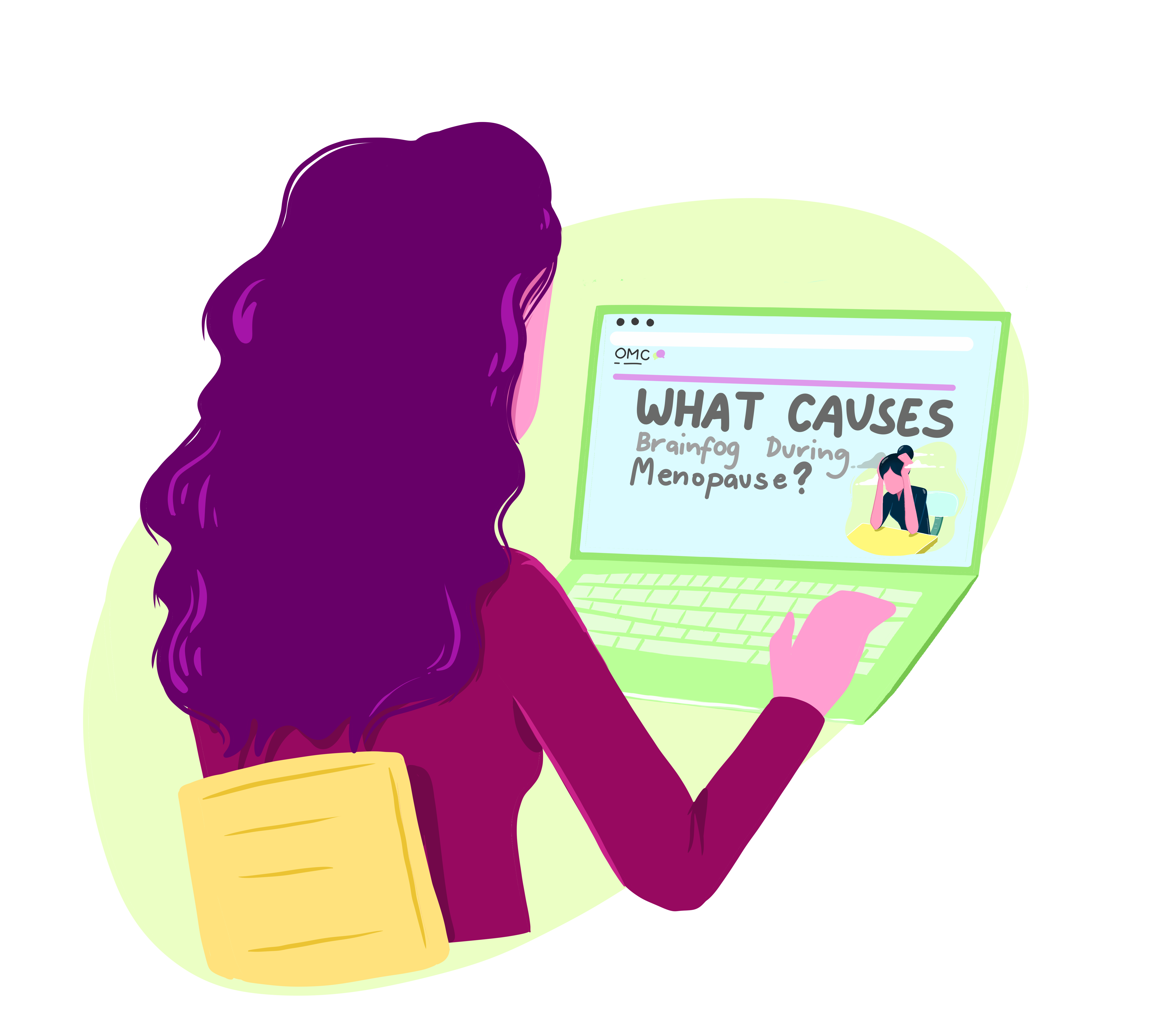Listen up, folks. If you’ve ever found yourself in the middle of a conversation, completely forgetting what you were about to say—or maybe losing your keys for the third time today—you’re not alone. Perimenopause brain fog is a real thing, and it’s something many women deal with as they transition into menopause. It’s like your brain decides to take a little vacation without telling you. But don’t worry, we’ve got you covered.
Let’s dive into the nitty-gritty of perimenopause brain fog. This isn’t just some made-up term; it’s a legit experience that affects millions of women worldwide. Whether you’re in your late 30s or early 50s, the hormonal rollercoaster of perimenopause can wreak havoc on your memory, focus, and overall cognitive function. And trust me, it’s not just in your head—literally.
But here’s the good news: you’re not powerless against it. In this article, we’ll explore real-life stories from women who’ve faced perimenopause brain fog, along with practical tips and expert advice to help you navigate this challenging phase. So grab a cup of tea, sit back, and let’s figure this out together.
- Unveiling The Truth Major Accident In Houston Texas
- Lindsay Lohan Wedding Ring The Glamorous Journey Of Love And Commitment
Table of Contents:
- What is Perimenopause Brain Fog?
- Common Symptoms of Perimenopause Brain Fog
- Real-Life Stories from Women Experiencing Brain Fog
- Causes of Perimenopause Brain Fog
- Tips to Manage Brain Fog
- Diet and Nutrition for Brain Health
- Exercise and Lifestyle Changes
- Mental Health Support and Strategies
- Expert Advice from Healthcare Professionals
- Conclusion: You’ve Got This
What is Perimenopause Brain Fog?
Alright, let’s get down to business. Perimenopause brain fog refers to the cognitive changes that occur during the perimenopause phase, which is the transition period leading up to menopause. Think of it as your brain’s way of saying, “Hey, things are about to change around here.” It’s not just forgetfulness; it’s a whole range of mental symptoms that can make you feel like you’re losing your grip.
During perimenopause, your estrogen levels start to fluctuate wildly. Estrogen plays a big role in brain function, affecting memory, attention, and mood. When these levels drop, it can lead to that infamous brain fog. And let’s be real, it’s not exactly fun to feel like you’re walking through a mental haze all day.
- Stacy Feldman The Rising Star Shaping The Entertainment Industry
- Dax Shepard Relapse A Candid Look At His Journey Recovery And Lessons Learned
Understanding the Hormonal Connection
Here’s the deal: estrogen isn’t just about reproductive health. It’s also a key player in brain chemistry. When estrogen levels dip, it can affect the neurotransmitters in your brain, like serotonin and dopamine, which are responsible for mood regulation and focus. So, if you’re feeling scatterbrained or moody, it’s not just in your head—it’s a hormonal thing.
Common Symptoms of Perimenopause Brain Fog
So, what does perimenopause brain fog actually feel like? Well, it’s different for everyone, but there are some common symptoms that many women report. Here’s a quick rundown:
- Forgetfulness: You know, like when you walk into a room and forget why you’re there. Classic brain fog move.
- Difficulty concentrating: Ever tried to read a book or watch a movie, but your mind keeps wandering? Yeah, that’s brain fog.
- Slower processing speed: Things that used to come naturally now feel like they take forever. It’s like your brain is running on dial-up internet.
- Mood swings: One minute you’re fine, the next you’re crying over a commercial. Hormones, am I right?
- Word-finding difficulties: You know the word you want to say, but it’s just… not there. It’s like your vocabulary went on vacation without you.
These symptoms might sound frustrating, but trust me, they’re totally manageable with the right strategies. Keep reading to find out how.
Real-Life Stories from Women Experiencing Brain Fog
Let’s hear from some real women who’ve been through the perimenopause brain fog journey. These stories might sound familiar, and they’ll remind you that you’re not alone in this.
Story 1: Sarah’s Struggle
Sarah, a 45-year-old marketing manager, noticed something was off when she started missing deadlines at work. “I’d sit down to write a report, and suddenly I’d forget what I was supposed to say. It was like my brain just shut down,” she recalls. Sarah’s experience is a common one, and it highlights how brain fog can affect your professional life.
Story 2: Lisa’s Journey
Lisa, a 48-year-old mom of two, found herself struggling to keep up with her kids’ schedules. “I’d forget to pick them up from school or double-book their activities. It was embarrassing, but I realized it wasn’t just me being careless—it was the brain fog,” she says. Lisa’s story shows how perimenopause can impact everyday life, even outside of work.
Causes of Perimenopause Brain Fog
So, what’s really causing all this mental fuzziness? Let’s break it down:
- Hormonal fluctuations: As we mentioned earlier, estrogen plays a big role in brain function. When levels drop, it can lead to cognitive issues.
- Sleep disturbances: Perimenopause often comes with sleep problems, like night sweats and insomnia. Lack of sleep can definitely contribute to brain fog.
- Stress: Let’s face it, life can be stressful. Add perimenopause to the mix, and it’s a recipe for mental exhaustion.
- Nutritional deficiencies: Some women find that their diets lack key nutrients like vitamin B12 and omega-3 fatty acids, which are essential for brain health.
Understanding the root causes of brain fog can help you address it more effectively. It’s not just about masking the symptoms—it’s about tackling the underlying issues.
Tips to Manage Brain Fog
Now that we’ve talked about what causes brain fog, let’s talk solutions. Here are some practical tips to help you manage perimenopause brain fog:
Tip 1: Stay Organized
Use planners, calendars, and reminders to keep track of important tasks. Having a system in place can help you stay on top of things, even when your brain feels foggy.
Tip 2: Prioritize Sleep
Getting enough rest is crucial for brain function. Try to establish a regular sleep schedule and create a relaxing bedtime routine to improve your sleep quality.
Tip 3: Practice Mindfulness
Meditation and mindfulness exercises can help reduce stress and improve focus. Even a few minutes a day can make a big difference.
Diet and Nutrition for Brain Health
Your diet plays a huge role in brain health, especially during perimenopause. Here are some key nutrients to focus on:
- Omega-3 fatty acids: Found in fish, flaxseeds, and walnuts, these fats are essential for brain function.
- Vitamin B12: This vitamin helps maintain nerve cells and is crucial for cognitive health.
- Antioxidants: Foods like berries, dark chocolate, and green tea are packed with antioxidants that protect your brain from damage.
Remember, you don’t have to overhaul your entire diet overnight. Small changes can add up to big results over time.
Exercise and Lifestyle Changes
Exercise isn’t just good for your body—it’s also great for your brain. Regular physical activity can improve blood flow to the brain, boost mood, and enhance cognitive function. Aim for at least 30 minutes of moderate exercise most days of the week.
And don’t forget about lifestyle changes. Reducing stress, limiting alcohol intake, and avoiding smoking can all help improve brain health during perimenopause.
Mental Health Support and Strategies
Perimenopause brain fog can take a toll on your mental health. If you’re feeling overwhelmed, don’t hesitate to seek support. Therapy, counseling, and support groups can provide valuable tools and strategies to help you cope.
Building a Support System
Talk to friends, family, or other women going through the same thing. Sharing your experiences can be incredibly validating and help you feel less alone.
Expert Advice from Healthcare Professionals
We spoke with Dr. Emily Carter, a gynecologist specializing in perimenopause, who had some valuable insights. “Perimenopause brain fog is a real and common issue, but it’s not something you have to live with forever. With the right interventions, most women can significantly improve their cognitive function,” she says.
Dr. Carter recommends a combination of lifestyle changes, dietary adjustments, and, in some cases, hormone therapy, to address brain fog. Always consult with a healthcare professional before starting any new treatment.
Conclusion: You’ve Got This
Perimenopause brain fog might sound daunting, but it’s not the end of the world. With the right strategies, support, and mindset, you can navigate this phase with confidence. Remember, you’re not alone in this journey, and there are plenty of resources available to help you along the way.
So, take a deep breath, give yourself some grace, and start implementing some of the tips we’ve discussed. And don’t forget to leave a comment or share this article with someone who might find it helpful. Together, we can conquer perimenopause brain fog and come out stronger on the other side.
- Missing Man Found Dead The Heartbreaking Story That Shook A Community
- Lil Wayne Las Vegas Residency The Hottest Show In Sin City


